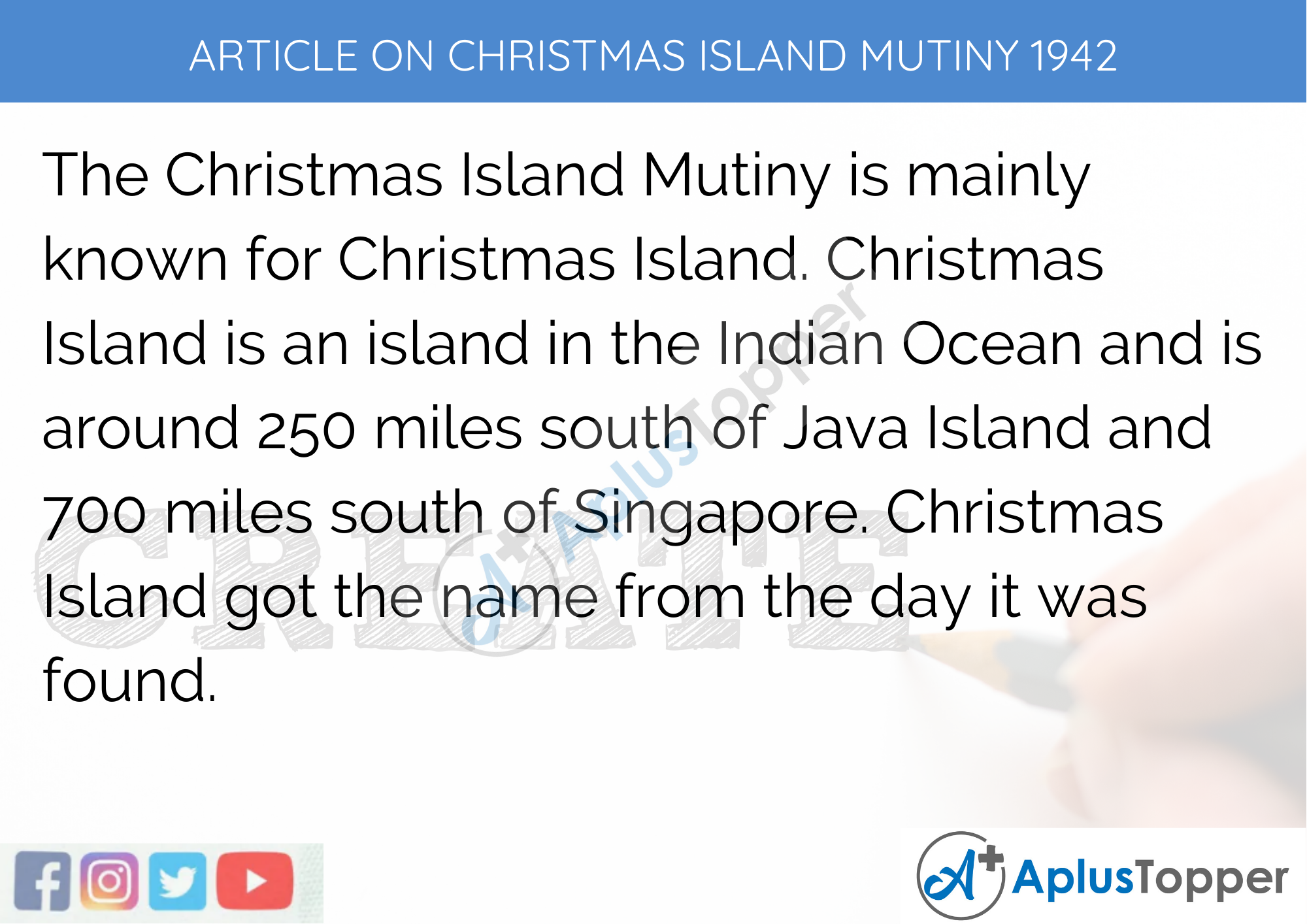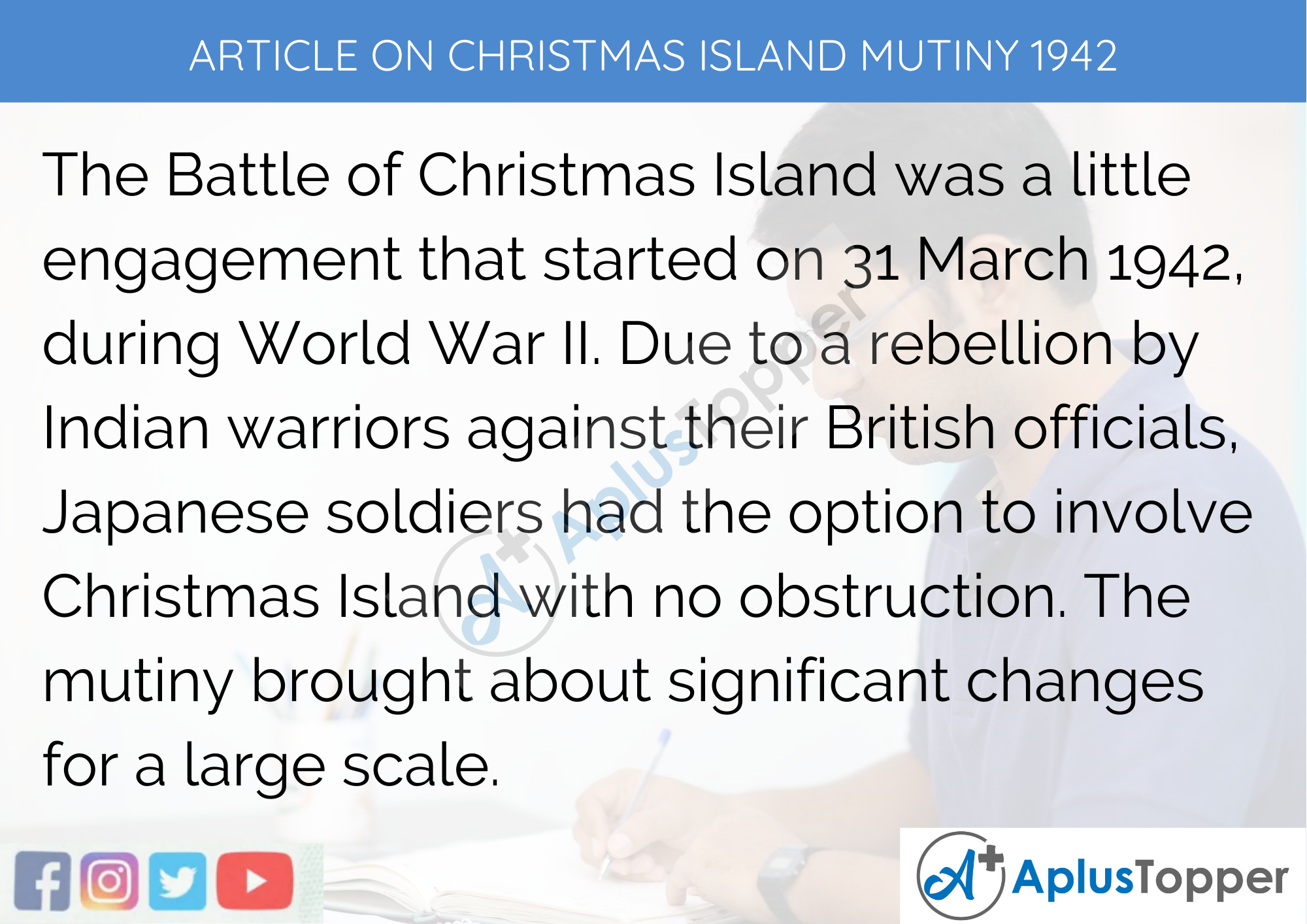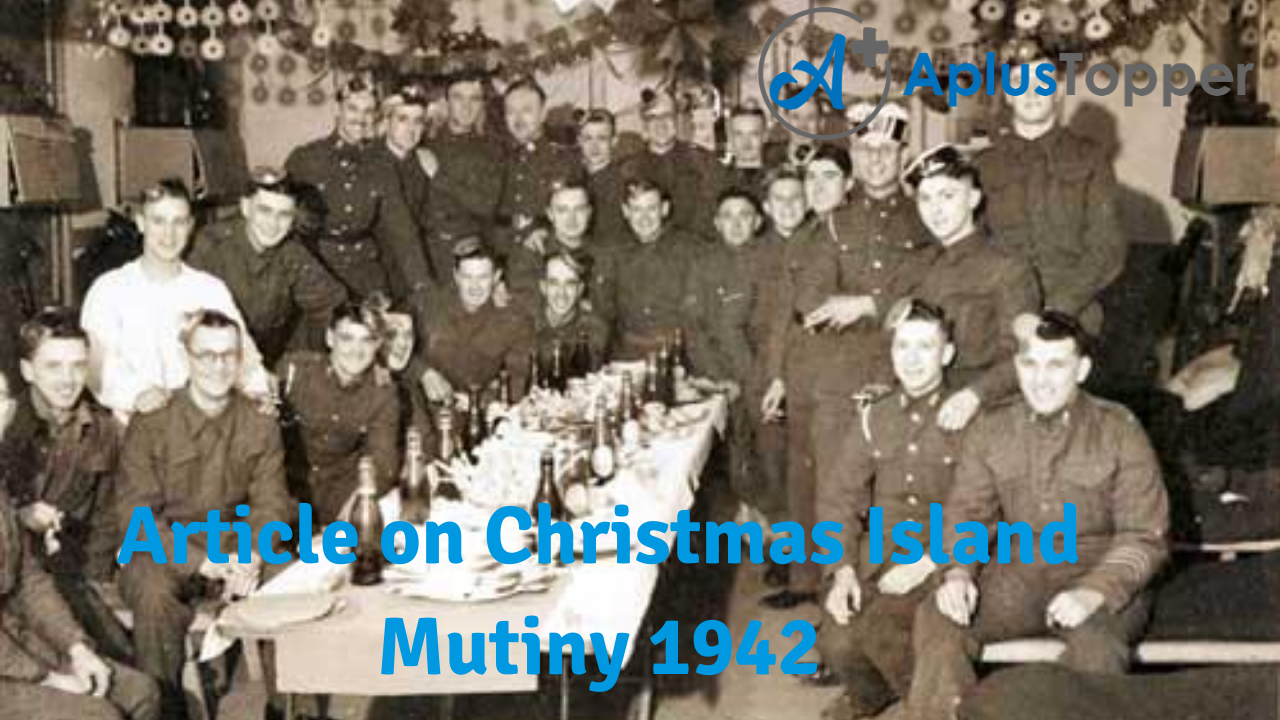Article On Christmas Island Mutiny 1942: The mutiny of Christmas Island of 1942, was a famous mutiny of India’s history of Independence. Christmas Island was a captured island in the Indian ocean by the British people. But the Hindu and Sikh people wanted them free from British rule. When the Japanese came to Christmas Island, they made the Indians believe in their strategy to remove British rule, which ultimately led to the mutiny by a troop of Sikh people murdering British officers.
But the ultimate result of the mutiny wasn’t successful, as it helped the Japanese capture Christmas Island, but the intention was evident that people wanted their freedom from British rule.
You can read more Article Writing about people, sports, technology many more.
Long And Short Articles On Christmas Island Mutiny 1942 for Students and Children in English
Christmas Island Mutiny 1942 is an essential part of the history of Independence of India, which should be known by every Indian citizen. Students who go to schools and colleges can get asked to write articles on the subject for their assignments and exams. The long Article on Christmas Island Mutiny 1942 are useful to people studying in classes 7, 8, 9, and 10. On the other hand, the short Article on Christmas Island Mutiny 1942 are standard among students of classes 1, 2, 3, 4, 5, and 6.

Long Article On Christmas Island Mutiny 1942 500 Words In English
The Christmas Island Mutiny is mainly known for Christmas Island. Christmas Island is an island in the Indian Ocean and is around 250 miles south of Java Island and 700 miles south of Singapore. Christmas Island got the name from the day it was found.
The Captain William Mynors, a merchant of the British East India Company, in his boat ‘The Royal Mary’, arrived at the Island on 25th December 1643 upon the arrival of Christmas; thus, he named it Christmas Island.
At the hour of Christmas Island Mutiny, Christmas Island was under the ownership of the British Government. The Island was a spot for settlement, particularly of Chinese and Malaya. Christmas Island was wealthy in Phosphate, and a large portion of its residents was utilized in mining it. T.P. Cromwell, who was a British Officer, was responsible for Christmas Island and was serving there with not many of his Indian Sikh equipped warriors.
During the later few years, unit of British Officer Captain L.W.T. Williams with an Indian Officer, Subadar Muzaffar Khan, was posted on the Island. Additionally, they were offered the help of four British Non-Commissioned Officers and heavy armament specialists with 27 Punjabi Non-Commissioned Officers and heavy armament specialists. A six-inch Gun was additionally mounted in the Island in 1940.
The days in Christmas Islands were serene till the day when not many Sikh Soldiers began a rebellion. This mutiny changed the historical backdrop of the entire Island.
Towards the start of 1942, a Japanese Naval Squadron was moving toward Christmas Island to capture it. The Naval Squadron barraged on Christmas Island, and it is said that his bombardment was trying if its Weapons were functioning well or not.
Skipper Williamson was terrified. As opposed to reacting, he waved a white banner to look after harmony since the Japanese had not bombarded with some unique explanation, so they left with no further activity.
The circumstance got typical after some time, yet this episode made a fierceness in Sikh warriors against the British official. They had comprehended that the Japanese could attack them whenever and capture them without any problem.
It was 10th March of the year 1942, and L.W.T. Williams was hosting a get-together with his four Non-Commissioned Officers and other significant British people. The gathering was working out in the right way, and soon it finished. All the officials at that point went to their Bed to have a decent rest. At noon, a group of few Sikh Soldiers, presumably the mutineers, who despised the Williams, fiercely murdered him and his four different Officers.
They dragged their bodies to the sea and dumped them there. Truly the mutineers got the help of the nearby police. The other Indian Soldiers, including Subedar Muzaffar Khan, likewise ran in fear, yet rebels asked them not to stress as they had come to murder just the British Officers.
The mutiny brought about significant changes for a large scale. They impressed the Japanese and helped them capture Christmas Island and made British people stay in India for a long time.
Short Article On Christmas Island Mutiny 1942 300 Words in English
The Battle of Christmas Island was a little engagement that started on 31 March 1942, during World War II. Due to a rebellion by Indian warriors against their British officials, Japanese soldiers had the option to involve Christmas Island with no obstruction. Nonetheless, later, the American submarine Seawolf did severe harm to the Japanese cruiser, Naka, which made the Japanese finally leave Christmas Island but gained a lot of phosphate and other goods from that Island.
Christmas Island was—at that point—a British belonging under authoritative control of the Straits Settlement arranged 161 mi (185 mi; 298 km) south of Java. It was significant for two reasons: it was an ideal control post for the eastern Indian Ocean territory. It was a significant wellspring of phosphates, which were required by the Japanese industry.
The Indian soldiers, obviously trusting Japanese promulgation concerning India’s freedom from British rule, mutinied and slaughtered their resting British officers on 10 March 1942, then locked up the District Officer and a couple of other European inhabitants of the island. But after the war, even though they slightly impressed Japanese people, they also helped them capture Christmas Island, which was not their ultimate goal. They also made the British people stay long in India instead of leaving.
After the war, seven rebels were followed and were indicted by a Military Court in Singapore, and five were condemned to death in 1947. The sentences were life imprisonment after the government of India and Pakistan made representations.
Christmas Island Mutiny was one of the distinguished histories of India’s Independence, which was a story of few Indian people tried to get Independence from British rule. Although it was not a success, the idea was clear from this mutiny that Independence was necessary for everybody. So, they struggled and sacrificed their lives to get Independence.

10 Lines On Christmas Island Mutiny 1942
- The Battle of Christmas Island was a small engagement which began on 31 March 1942, during World War II.
- It was a mutiny by soldiers of the British Indian Army against their British officers.
- Imperial Japanese Army troops were occupied Christmas Island.
- Christmas Island was a British possession under the administrative control of the Straits Settlement.
- A group of Punjabi troops believed Japanese propaganda concerning the liberation of India from British rule.
- They mutinied the British officers on 11th March.
- After that, they were imprisoned.
- This mutiny paved the way for the Japanese to capture Christmas Island.
- Later, The United States Navy submarine Seawolf caused severe damage to the Imperial Japanese Navy cruiser Naka.
- This made the Japanese leave Christmas Island.
FAQ’s on Article on Christmas Island Mutiny 1942
Question 1.
What happened during the Mutiny of Christmas Island?
Answer:
A mutiny of Indian troops led by a Sikh police officer murdered five British soldiers.
Question 2.
In which ocean, Christmas Island is situated?
Answer:
In the Indian Ocean, about 224 miles south of the island of Java, Christmas island is situated.
Question 3.
Who tried to captured Christmas Island?
Answer:
The Japanese tried to capture Christmas Island.
Question 4.
What was the result of the Mutiny?
Answer:
The mutiny resulted in imprisonment and life sentences of the mutinies.
